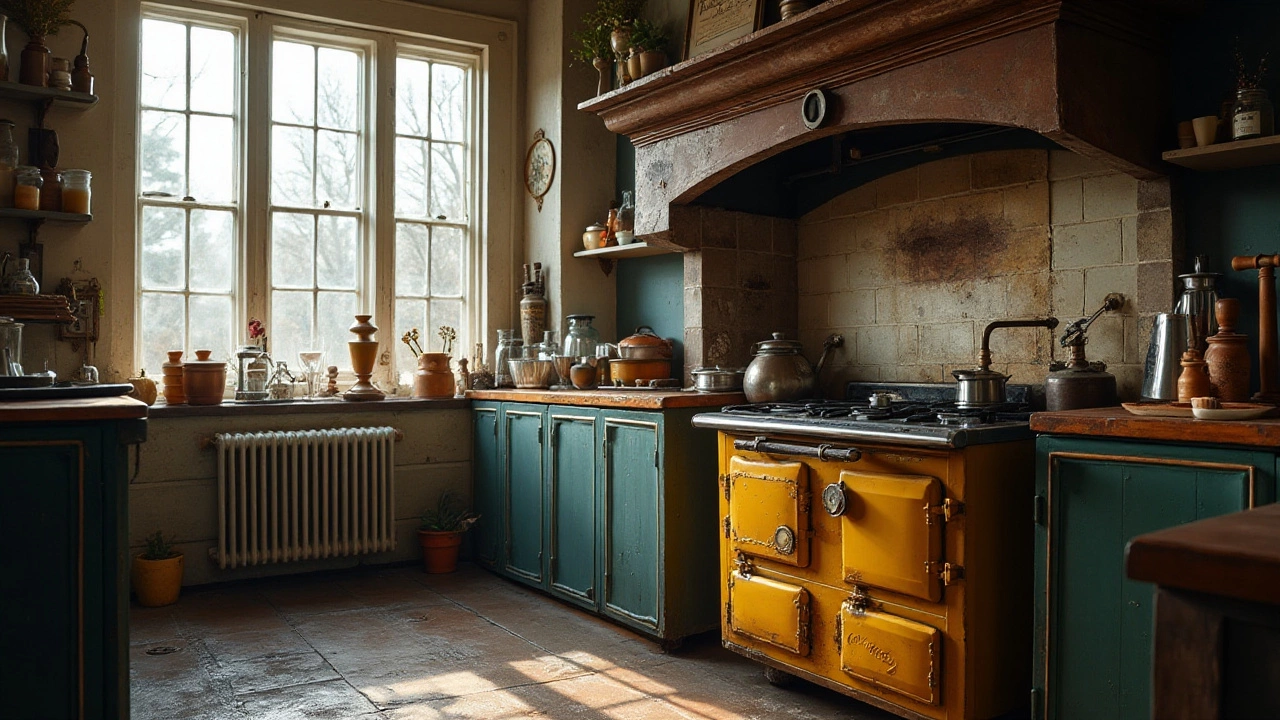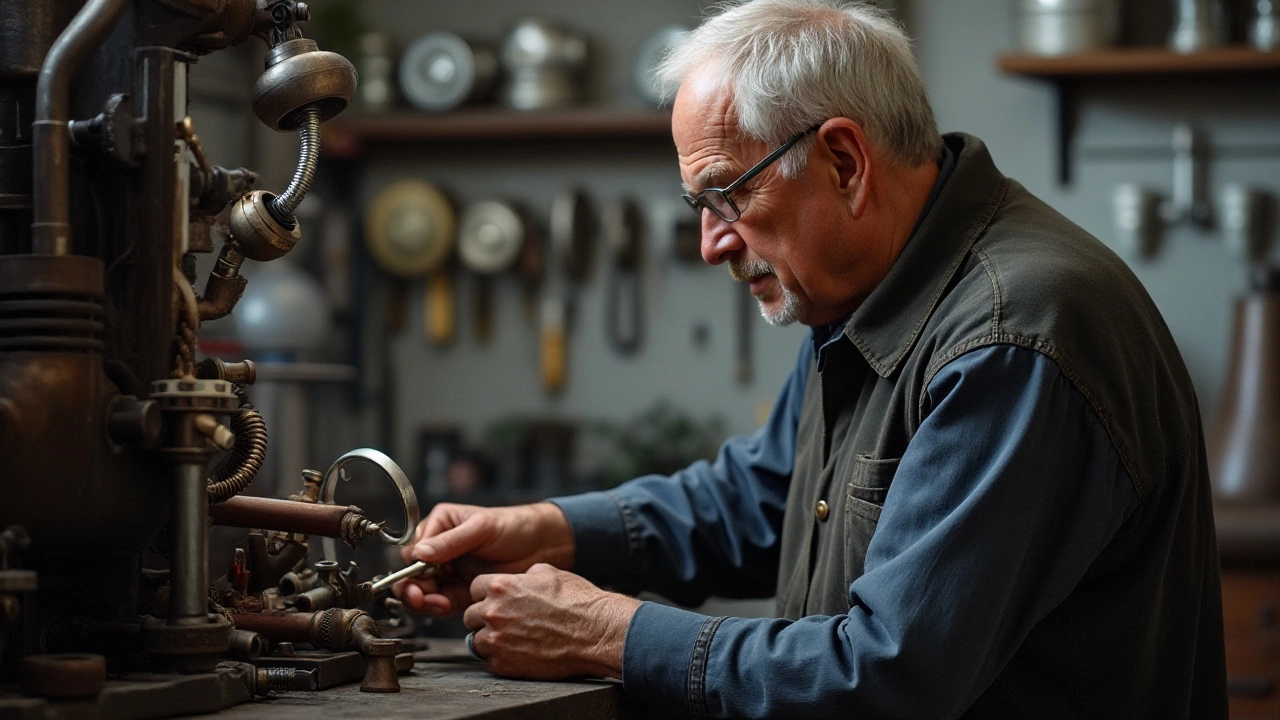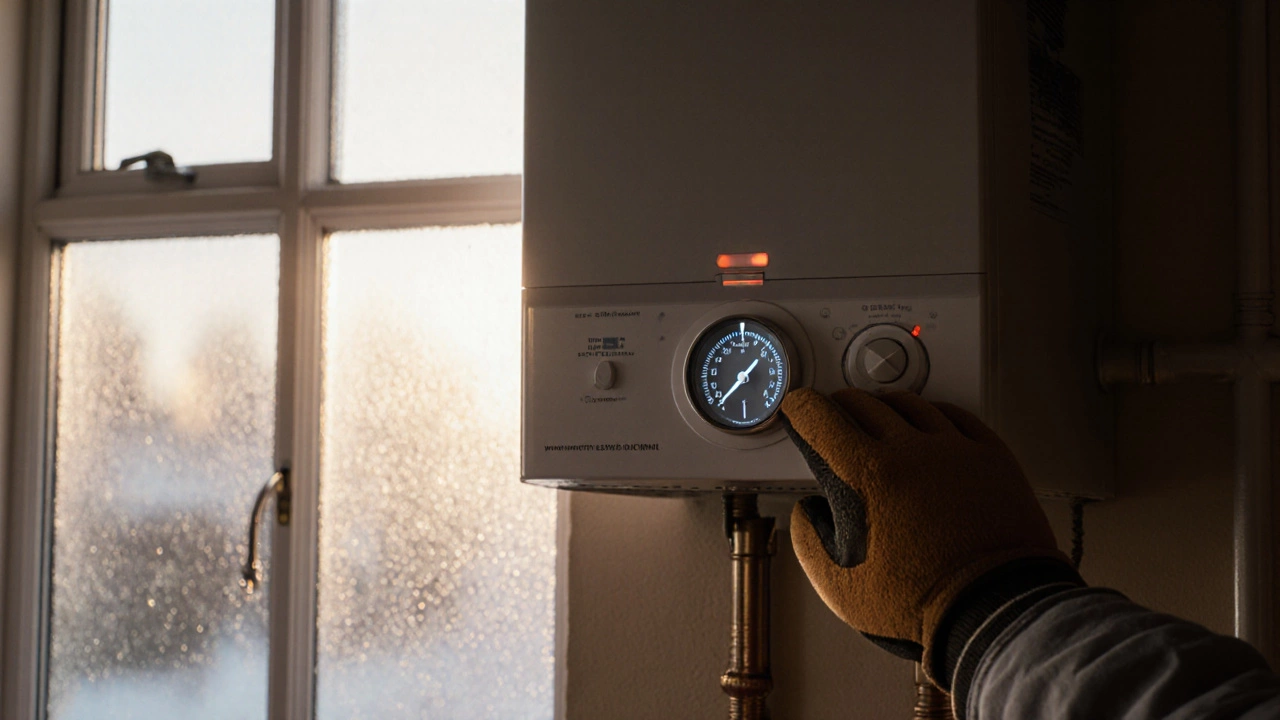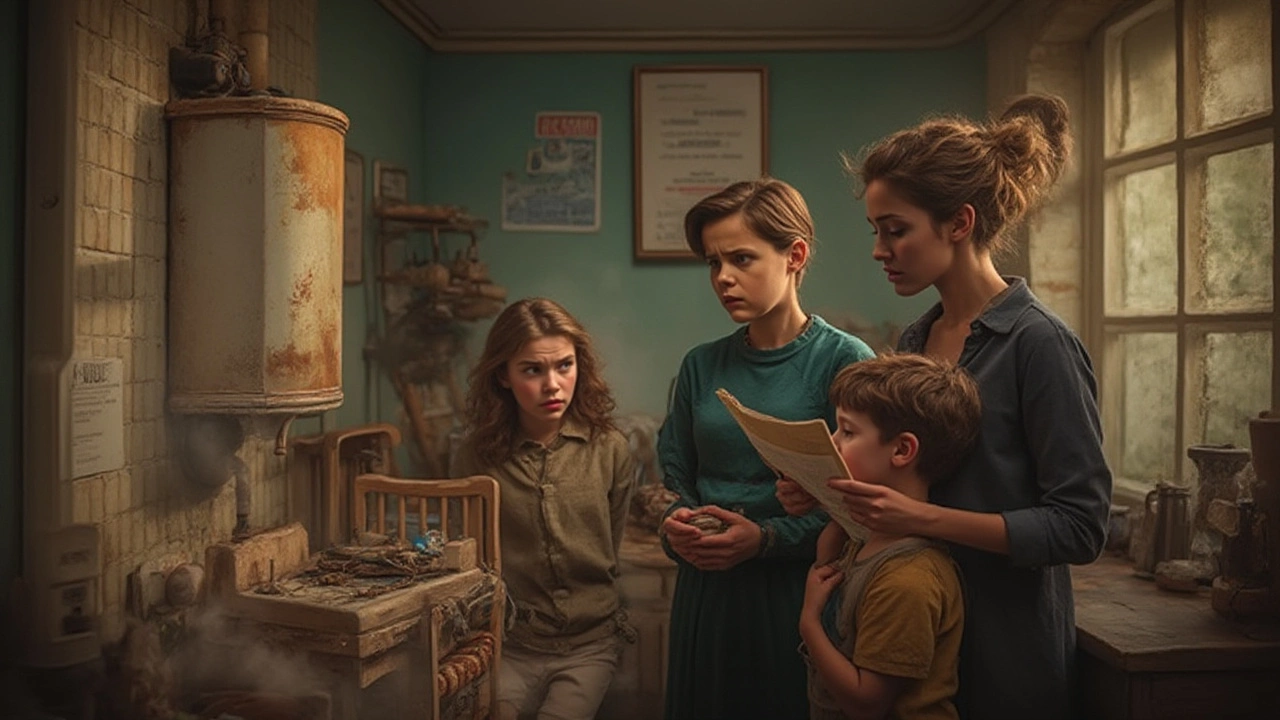
- 9 Oct 2024
- Gideon Thornton
- 0
Boilers are the silent workhorses of our homes. Nestled away, often out of sight, they toil tirelessly through the crisp winter nights, keeping our spaces cozy. But the question on many minds is, can these sturdy steel giants endure the test of time for as long as 50 years?
It's an intriguing thought, as a boiler functioning for half a century is no small feat. While not common, it is within the realm of possibility if conditions are just right and the boiler receives dedicated care. But, before we get into all of that, let's start by understanding the typical lifespan most folks can expect from their trusty home heating friend.
- Lifespan of a Typical Boiler
- Factors Influencing Boiler Longevity
- Maintenance Tips for Prolonged Life
- Signs Your Boiler Needs Replacing
- Technological Advances in Boiler Design
- When to Consider a Replacement
Lifespan of a Typical Boiler
When we consider the lifespan of a typical boiler, it's crucial to acknowledge the diversity found among these machines. Most boilers, constructed to withstand daily use, can endure anywhere from 15 to 30 years. A lot of this depends on the type of boiler and the care it receives over the years. While it's possible for a boiler to live even longer, certain conditions must be met. Regular maintenance and consistent attention to the system can often push the lifespan towards the higher end of that scale.
The type of boiler plays a significant role in its longevity. Combi boilers, known for their efficiency and compact nature, often have a slightly shorter lifespan due to the complexity of parts and ongoing pressure they are under. On the other hand, traditional boilers - those massive beasts often housed in old homes - sometimes show surprising longevity. Cast iron and copper makeouts contribute to their hardiness, with some reaching well into their 30s. A quote from the Heating and Hot Water Industry Council (HHIC) underlines the importance of regular service, "Annual servicing of your boiler is akin to maintaining the health of your household engine. It pays off in both longevity and efficiency."
Annual servicing of your boiler is akin to maintaining the health of your household engine. It pays off in both longevity and efficiency. — Heating and Hot Water Industry Council (HHIC)
Environmental factors also come into play. The quality of the water can cause sediment and mineral build-up leading to reduced efficiency and increased wear. Similarly, the type of fuel used - whether it's gas, oil, or electricity - can have varying effects on longevity. It turns out that gas boilers, for instance, are often more durable and require less maintenance compared to their oil counterparts. With conscientious care and attention to these variables, some homeowners have managed to stretch the life of their boilers to nearly 50 years. However, for most, reaching the jubilee milestone remains more of a fairytale than a reality.
Considering advancements in technology, modern boilers include materials and sophisticated systems designed to enhance performance and durability. It is not uncommon for newer models to exceed older predictions for lifespan. A great deal rests on the shoulders of those who manage and care for these vital household physicians. A boiler's twilight years can be extended or cut short by user attentiveness. Regular inspections and prompt repairs safeguard your boiler, promising many warm winters ahead. Without this, what should have been an enduring piece of kit might become an early retirement statistic.
Factors Influencing Boiler Longevity
When it comes to the life span of a boiler, several key factors come into play that can either extend or shorten its working life. First and foremost, one major element to consider is the make and model of your boiler. Not all boilers are created equal; some brands have built a reputation for producing equipment that stands the test of time. Companies with longstanding expertise tend to use high-quality components that withstand wear and tear better than those used in more budget-friendly versions. This choice at the time of purchase can make a significant difference in how many years you can expect from your trusty appliance.
The environment where your boiler is installed also heavily influences its longevity. Boilers tucked away in basements or garages might fare differently due to varying levels of humidity and ambient temperatures. For instance, areas prone to higher humidity levels might lead to faster corrosion, especially in parts made from less durable materials. Moreover, the usage pattern plays a vital role too. A boiler that works hard in a sprawling household using hot water and heating extensively will experience more stress compared to one in a smaller home or a rarely used holiday property.
Maintenance routines are another critical point to consider. Regular servicing by qualified professionals can spot early signs of trouble, ensuring timely repairs and maintenance. A well-maintained boiler not only operates more efficiently but also ages gracefully. It's amazing how many potential issues can be averted simply by adhering to an annual service schedule. This ensures that all components perform optimally and reduces undue strain on any part of the boiler system.
According to a Survey by Which? in 2023, owners who commit to annual maintenance tend to see their boilers last up to five years longer on average.
Water quality within your home can't be overlooked either. In areas with hard water, mineral deposits can accumulate in the boiler, leading to blockages and inefficiency. This can hasten the need for repairs and replacements, often significantly reducing the boiler's life span. To combat this, water softening solutions can prove beneficial, preserving the internal components of the boiler. Lastly, technological updates in the boiler industry introduce new features and controls that optimize performance, helping newer models run more sustainably.
These factors collectively define how long a boiler may serve you. While some might wear out after a decade or two, adhering to best practices might just see a boiler defy the odds and possibly inch closer to that mystical 50-year mark. By understanding and accommodating these factors, homeowners can proactively take measures to squeeze the most life out of their heating companions, ensuring warmth and comfort long into the future.

Maintenance Tips for Prolonged Life
Caring for your boiler is not just about keeping the warmth flowing in your home; it's also about squeezing every extra year of service from your appliance. A bit of love and regular attention can work wonders for your boiler's lifespan. So, let's talk about some practical, hands-on tips that can help you make the most of your heating system. First off, annual servicing is crucial. This is where an expert comes in, checking the inner workings of your boiler, cleaning components, and ensuring that everything runs smoothly. Not only does this maintain efficiency, but it can also prevent minor issues from snowballing into costly repairs.
Another important tip involves regularly checking the pressure gauge. Your boiler operates best within a specific range, usually between 1 and 1.5 bars. If the pressure is too low or too high, it can cause stress on the system, reducing its longevity. Balancing the radiators is another straightforward task that can make a difference. By releasing trapped air, you improve heat distribution throughout your home, which not only warms corners better but also eases the burden on the boiler. Surprisingly, bleeding your radiators is an easy job that only takes a few minutes and a radiator key.
Keep an eye on your boiler's environment too. Avoid storing clutter or flammable materials nearby, as these can be a safety hazard and impact your boiler's efficiency. It's equally important to ensure the surrounding space is well-ventilated. And if your boiler is in the loft or a cupboard, checking the insulation here can also help. Protecting pipes with lagging, especially in colder months, prevents freezing, which can lead to damaging bursts. These inexpensive foam tubes are easy to install and act as a simple yet effective preventative measure.
Keeping Things Spotless
A clean system is a happy system. Regularly cleaning around your boiler, removing dust and debris, helps keep it functioning well. But there's more: power flushing your central heating system every few years can boost efficiency. This involves flushing out sludge, rust, and other grimy build-ups with powerful cleaning chemicals. In doing so, the hot water can circulate with ease, warming your home faster and cutting down on boiler wear and tear. The better the water flow, the less hard your boiler has to work, prolonging its life.
"A stitch in time saves nine, as the saying goes, and proper maintenance can prevent disasters down the line," notes heating engineer and consultant John Russell.
- Monthly Boiler Journal
Keep a record of repairs and maintenance service. This way, you and your service technician can easily track patterns or ongoing issues, making future repairs more straightforward and efficient. It’s also good practice to check the manufacturer's warranty and service agreement regularly. By following these boiler maintenance tips diligently, you can enjoy many warm, trouble-free winters.
Signs Your Boiler Needs Replacing
Boilers don't send you flamboyant signals when they are about to retire, slipping quietly into the realm of inefficiency. It's left to us, the diligent homeowners, to spot these little hints and decide when it's time to bid farewell to our old heat-giver. One telltale sign that your boiler is past its prime includes a noticeable decrease in its efficiency; you know, when the house feels colder than it should despite the settings being spot on. Older boilers tend to lose efficiency over time, sucking up more fuel, and inadvertently hiking up the energy bills. When your monthly heating statement reads like a ransom note, it might be time to consider a change.
Age is another factor that storytells like no other. Most boilers churn out their best work between 10 to 15 years, although with perfect conditions and pristine maintenance, some can last much longer. But if your boiler was around to witness your kids’ first steps and your family dog being just a pup, then it might be marching towards the end of its timeline. Parts start to wear out and finding replacements becomes a treasure hunt as the model gets discontinued, making it increasingly difficult to maintain the now grandma boiler.
Boiler lifespan is often tested when strange sounds begin to echo from its depth. If every start and stop of your boiler resembles an orchestrated symphony of clanks, hisses, and clangs, it could be a sign of internal parts, perhaps the heat exchanger or the pump, starting to fail. These unsettling noises usually hint at sediment build-ups or corrosion, which, if not promptly handled, could lead to complete system failure.
Martha Andrews, a seasoned HVAC expert, once remarked, "Listen closely to your boiler, for when it talks, it tells you everything about its health."
An unerring cue for replacement occurs when repairs are becoming the new normal. As the boiler ages, breakdowns tend to become frequent chatter in your household. If the repair bills are outpacing the cost of a new model, it’s advisable to explore new, more efficient options. It's a situation that's neither friendly to your wallet nor your peace of mind.
Another clear indicator could be carbon monoxide leaks, represented by a yellow or flickering pilot light. Carbon monoxide is a dangerous, colorless, and odorless gas. If noticed, immediate action is necessary. It’s not merely a sign for boiler replacement, but a potentially life-saving measure. A newer boiler design can significantly reduce such risks, providing you with both warmth and security. So, when these signs start showing up persistently, consider the benefits of investing in new boiler longevity.

Technological Advances in Boiler Design
It's fascinating how leaps in technology have breathed new life into the age-old concept of the boiler. Once hulking beasts with a reputation for being bulky and energy-hungry, modern boilers have transformed remarkably with an array of innovations making them more efficient and environmentally friendly. Central to these advancements is the rise of condensing technology, which has revolutionized how boilers operate by harnessing heat that would have otherwise been wasted, achieving efficiency rates of over 90%.
Another notable breakthrough in boiler design is the advent of smart technology. As more homes transform into smart homes, boilers have kept pace. Imagine controlling your boiler's temperature via an app on your phone, even while you're bundled up beneath layers of blankets on a frosty night. This is no longer a distant dream—with smart controllers, you can adjust heating schedules on the go, optimize usage, and receive maintenance alerts. These features not only enhance user convenience but also contribute to energy savings over time.
"Smart technology integration in boiler systems is paving the way for significant energy efficiency improvements and cost savings," said an expert from the Institute of Engineering and Technology.
Yet, as impressive as these developments are, attention has also turned toward sustainable innovations. Engineers are exploring hybrid systems that combine gas-fired boilers with renewable energy sources like solar panels, blending tradition with cutting-edge innovation for eco-friendlier heating solutions. This reflects the growing demand for greener alternatives amid our planet's pressing climate change challenges.
Of course, advances aren't limited to internal mechanics and control systems. The very materials used in boiler construction have seen an evolutionary trajectory. Today's boilers leverage lightweight, corrosion-resistant composites and stainless steel that can withstand high pressures and temperatures without sacrificing durability. This contributes to enhanced boiler longevity and reduced maintenance needs, much to the delight of homeowners and property managers alike.
An interesting trend is the miniaturization of components, which has made it possible for modern units to fit into tight spaces—a far cry from the substantial installations of yesteryear. With compact and sleek designs, new boiler models accommodate the rising availability of smaller living quarters, especially in urban settings where space is at a premium.
To see just how far we've come, it helps to juxtapose past and present. Here’s a table that outlines some of the key technological distinctions that have reshaped modern boiler design:
| Feature | Traditional Boilers | Modern Boilers |
|---|---|---|
| Efficiency | 60-70% | 90%+ |
| Control | Manual Thermostats | Smart Technology |
| Materials | Heavy Metals | Lightweight Composites |
| Size | Bulky | Compact |
With these advancements, the stories of boilers reaching the half-century mark don't seem far-fetched, especially with proper care and updates. Homeowners are more empowered than ever to choose equipment that champions both performance and sustainability. It's a brave new world for boilers, and the journey into the future looks promising.
When to Consider a Replacement
Deciding when it’s time to replace your boiler might be akin to letting go of an old friend. It's been reliable through numerous frosty mornings and chilly nights, but there's a moment when you must face reality. Every home heating enthusiast should be aware of the signs hinting at a boiler's inevitable farewell. Let's embark on this journey with a tale of numbers. A typical boiler, even with stellar maintenance, has a lifespan of about 15 to 25 years. Reaching beyond this threshold, regardless of love and care, often marks the point where repairs become more frequent, denting your wallet with regularity. Trust those age markers; they don't lie. With wear and tear taking their toll, the efficiency of even the best boilers begins to wane over the decades. So when your boiler shows signs of age, with strange noises and increasing repair costs, it might be time to consider letting it retire gracefully.
Another compelling reason to consider a replacement is the advent of technological advances in boiler design. Newer models boast superior efficiency, potentially reducing your energy bills significantly. For some, this trade-off, upfront investment for long-term savings, is an empowering decision. The charm of old equipment might be tempting, but modern boilers often include smart features and eco-friendly credentials. These improvements not only lower your carbon footprint but might also add value to your home in the long run. Let’s not forget, alas, those frustrating breakdowns in the coldest months. When you face repeated breakdowns, the decision to replace becomes clearer; the frustration and inconvenience can take a toll on your comfort and peace of mind. Repeated repairs may suggest internal components are failing and, at times, replacing can be more cost-effective.
An essential aspect to consider is safety. Boilers have the potential to pose serious risks if not operating correctly. Older models are more susceptible to releasing carbon monoxide, an insidious and odorless gas that can be life-threatening. Be vigilant of any signs: yellow flames or black soot on and around the boiler, for instance, indicate incomplete combustion. These are warning lights urging immediate attention or replacement. Also, take heed when your boiler no longer heats water effectively or when your radiators take ages to warm up. Such inefficiencies not only increase your utility bills but also tell an unspoken story of wear and fatigue.
According to the Energy Saving Trust, "Replacing an old gas boiler with an A-rated high-efficiency condensing boiler and improving your heating controls will significantly cut your home's carbon dioxide emissions – and could save as much as £300 per year."This is indeed a compelling revelation for any homeowner pondering over making the switch.
Let's wrap this up by weighing the pros and cons. If your boiler demands a consistent stream of repairs and attention akin to a needy pet—whilst your energy bills climb steadily—it’s probably time to embrace change. Factors such as improved performance, energy savings, and enhanced safety play a crucial role when evaluating whether to hold onto nostalgic loyalty or leap into the new age of heating technology. The decision might stir your emotions, but it's a decision that promises the warmth and comfort your home deserves. Here is a quick checklist to assist you:
- Boiler exceeds 15-20 years of age.
- Frequent breakdowns or repairs.
- High energy bills due to inefficiency.
- Yellow flames or black soot around the appliance.
- Lack of compatibility with new eco-friendly standards.




